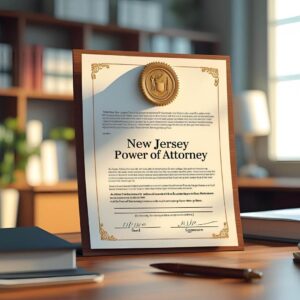Practice Areas
Understanding the New Jersey Power of Attorney
 Planning for the future isn’t just about writing a will—it’s also about ensuring the right person can make decisions for you when you’re unable to. That’s where a Power of Attorney (POA) comes in. In New Jersey, creating a POA gives someone legal authority to act on your behalf, whether temporarily or permanently, in specific or broad circumstances.
Planning for the future isn’t just about writing a will—it’s also about ensuring the right person can make decisions for you when you’re unable to. That’s where a Power of Attorney (POA) comes in. In New Jersey, creating a POA gives someone legal authority to act on your behalf, whether temporarily or permanently, in specific or broad circumstances.
But not all POAs are the same—and the rules in New Jersey differ from those in many other states. Here’s what you need to know.
What Is a Power of Attorney?
A Power of Attorney is a legal document that allows you (the “principal”) to appoint another person (the “agent” or “attorney-in-fact”) to make decisions on your behalf. These decisions can relate to finances, property, healthcare, or other personal matters. The scope and duration of that authority depend on the type of POA you create.
Types of Power of Attorney in New Jersey
Each type of POA serves a different purpose. Understanding your options will help you choose the right document for your circumstances:
1. General POA (Non-Durable)
This grants broad authority to your agent to manage your financial or legal affairs—but it ends automatically if you become incapacitated. It’s often used for temporary purposes, such as during travel or short-term absence.
2. Durable POA
A Durable POA remains in effect even if you become mentally or physically incapacitated. It is commonly used in long-term estate planning and ensures continuity if you can no longer manage your affairs.
Case Study 1: The Durable POA in Action
An individual in their early eighties had proactively executed a Durable Power of Attorney, naming a close family member as their agent. When a sudden, debilitating medical event left them unable to communicate or manage their affairs, the designated agent could immediately step in. This enabled the seamless payment of medical bills, management of investment accounts, and arrangement for necessary home modifications, all without needing lengthy and expensive court proceedings for guardianship. The document ensured the individual’s wishes were honored during a challenging time, demonstrating the critical role of a durable power of attorney in protecting one’s well-being.
Note: The document must include specific language indicating that it is durable, or it will not survive incapacity under NJ law.
3. Medical Power of Attorney (Healthcare Proxy)
This document allows your agent to make medical decisions for you if you become unable to do so. It’s often combined with an Advance Directive or Living Will to communicate your healthcare preferences.
4. Limited or Special Power of Attorney
This type is used to give your agent authority over a specific task or transaction—such as selling a property, handling banking matters, or signing documents on a particular date.
5. Springing Power of Attorney
A Springing POA only becomes effective upon the occurrence of a specific event—usually the incapacitation of the principal. This type offers peace of mind to those who don’t want the POA active until absolutely necessary.
Be aware: Springing POAs can lead to delays, as the agent must prove the triggering condition (typically incapacity) has occurred.
Why You Should Consult a New Jersey Attorney
Power of Attorney documents can carry significant legal weight. Choosing the wrong type—or using a form that doesn’t meet New Jersey’s requirements—can result in serious consequences, including rejected transactions, delayed care, or legal disputes.
At Zager Fuchs, P.C., we help individuals and families craft customized, legally sound Power of Attorney documents that meet their needs and comply with New Jersey law.
Need help creating or reviewing your Power of Attorney?
Contact Andrew Krantz at Zager Fuchs today to schedule a consultation and ensure your future is protected.
